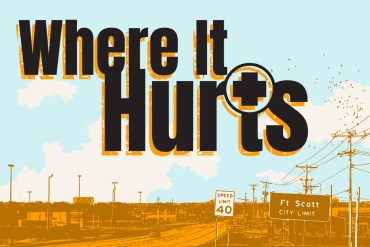The Mask Hypocrisy: How COVID Memos Contradict the White House’s Public Face
When in public, President Donald Trump and Vice President Mike Pence join crowded rallies where many do not wear masks. Behind the scenes, the White House is recommending states adopt mask mandates and even fines — leaving it up to local officials to handle the consequences.
Efforts to Keep COVID-19 out of Prisons Fuel Outbreaks in County Jails
Montana sheriffs say the state’s decision to halt prison transfers has led to overcrowding that makes it difficult to quarantine inmates and clean facilities.
‘No Mercy’ Explores the Fallout After a Small Town Loses Its Hospital
Listen to “Where It Hurts,” each episode debuting on Tuesdays, from Sept. 29 through Nov. 10. When Mercy Hospital Fort Scott shut its doors, locals lost care. Health workers lost jobs. The hole left behind is bigger than a hospital. Season One is “No Mercy.”
Heartbreaking Bills, Lawsuit and Bankruptcy — Even With Insurance
With health insurance that can leave him on the hook for more than a quarter of his salary every year, a Kentucky essential worker who has heart disease is one of millions of Americans who are functionally uninsured. At only 31, he has already been through bankruptcy and being sued by his hospital. This year, he faced a bill for more than $10,000.
How Families Are Keeping Halloween From Turning Into a COVID Nightmare
Parents are turning to spooky scavenger hunts, pumpkin-carving and movie nights as alternatives to trick-or-treating. Health professionals have their own advice on how to safely celebrate Halloween during the pandemic.
Rural Hospitals Teeter on Financial Cliff as COVID Medicare Loans Come Due
A lack of direction from federal administrators is causing confusion for many hospital administrators. Rural hospitals are among the ones hit hardest.
Urban Hospitals of Last Resort Cling to Life in Time of COVID
Rural hospitals have been closing at a quickening pace in recent years, but a number of inner-city hospitals now face a similar fate. Experts fear that the economic damage inflicted by the COVID pandemic is helping push some of these urban hospitals over the edge at the very time their services are most needed.
Lack of Antigen Test Reporting Leaves Country ‘Blind to the Pandemic’
A KHN review found more than 20 states either don’t count or have incomplete data on the use of COVID-19 antigen tests, leaving the public in the dark about the true scope of the pandemic.
With No Legal Guardrails for Patients, Ambulances Drive Surprise Medical Billing
Studies show that at least half of ground ambulance rides across the nation leave patients with “surprise” medical bills. And a $300-a-mile ride is not unusual. Yet federal legislation to stem what’s known as balance billing has largely ignored ambulance costs.
Kids Are Missing Critical Windows for Lead Testing Due to Pandemic
Inspections for lead hazards and blood testing for lead have dropped significantly just as kids are spending more time in the places where their exposure to the poisonous metal is highest: their homes.
Obamacare Co-Ops Down From 23 to Final ‘3 Little Miracles’
Once there were 23 of these nonprofit plans across 26 states; in January there will be only three, serving Maine, Wisconsin, Montana, Idaho and Wyoming.
Altered Mindsets: Marijuana Is Making Its Mark on Ballots in Red States
Voters in Montana, Nebraska, South Dakota and several other conservative-leaning states will decide in November whether to legalize medical or recreational marijuana.
HHS Plan to Improve Rural Health Focuses on Better Broadband, Telehealth Services
The proposal details a wide-ranging agenda to remedy the gaps in health care and myriad challenges in rural America. In addition to more telehealth options, it includes shifts in hospital payments and expanded funding for school-based mental health programs.
Swab, Spit, Stay Home? College Coronavirus Testing Plans Are All Over the Map
2020 will be a year like no other on college campuses, as every institution makes its own rules. Some have no plans to routinely test students for the coronavirus; others aim to test every student and staff member twice a week.
Politics Slows Flow of US Pandemic Relief Funds to Public Health Agencies
Congress has allocated trillions of dollars to ease the coronavirus crisis. A joint KHN and AP investigation finds that many communities with big outbreaks have spent little of that federal money on local public health departments for work such as testing and contact tracing.
Back to Life: COVID Lung Transplant Survivor Tells Her Story
The first known coronavirus patient in the U.S. to undergo a double lung transplant is now strong enough to share the story of her ordeal.
In Rural Missouri, Latinos Learn to Contain and Cope With the Coronavirus
In a town in the southwestern corner of Missouri, where COVID-19 has disproportionately affected Latino immigrants, language barriers and economic pressures among factory workers have stymied efforts to slow the virus that causes the disease.
Missouri Voters Approve Medicaid Expansion Despite GOP Resistance
Missouri is the sixth state to use a ballot initiative to extend Medicaid eligibility. Most of the remaining states that have not expanded Medicaid are Republican-leaning states in the South.
Missourians to Vote on Medicaid Expansion as Crisis Leaves Millions Without Insurance
Around the country, Medicaid enrollment is up as people who have lost jobs during the pandemic seek health insurance. Expanding eligibility for Missouri’s program, which could help thousands of recently unemployed residents, will be on the ballot Tuesday.
Listen: How the Pandemic Further Politicized Public Health
KHN Midwest correspondent Lauren Weber joined Texas Public Radio’s David Martin Davies on “The Source” show to talk about the politicization of public health during the COVID pandemic.



























